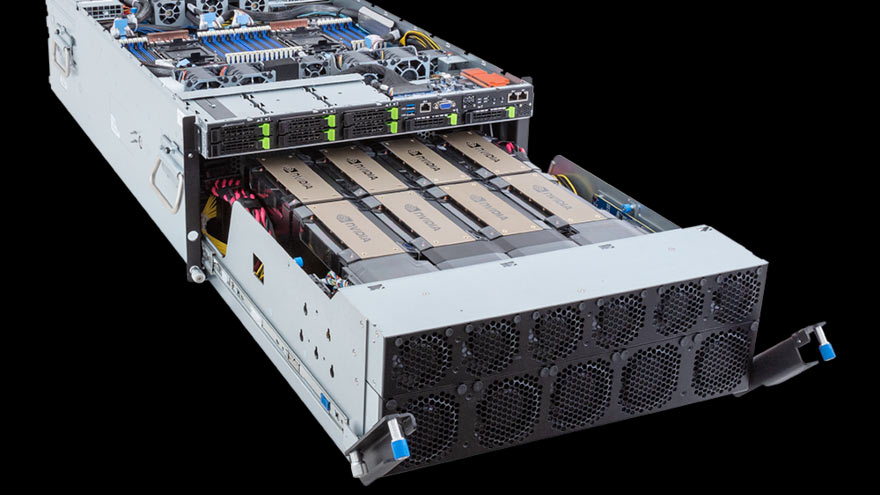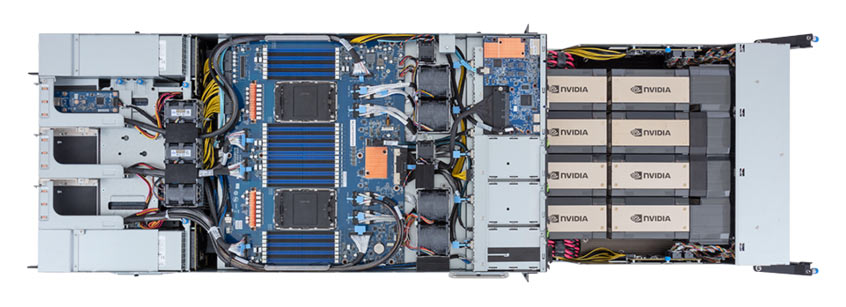Chinese may be evading Nvidia GPU sanctions with Dell, Gigabyte, and Supermicro servers: Report
The big question is whether the GPUs were already in China before sanctions were tightened.

Investigations have provided evidence that China-based organizations could still get their hands on sanctioned Nvidia GPUs as recently as Feb 28, 2024. According to Reuters, Chinese universities and research institutes may have sidestepped the sanctions on the most powerful GPUs by buying servers packing these powerful accelerators. However, an Nvidia spokesperson indicated that the products sold were likely to include stocks that had been previously exported to resellers in China.
Tender documents uncovered by Reuters reveal that ten Chinese entities acquired advanced Nvidia chips between Nov 20, 2023, and Feb 28, 2024, by simply ordering servers equipped with them. It is noted that Dell, Gigabyte, and Supermicro server products (including the sanctioned Nvidia GPUs) were sold in China after the Nov 17 expanded embargo, raising questions about sanctions-swerving. Remember, this sanctions policy adjustment even encompassed Nvidia GPUs like the GeForce RTX 4090 consumer graphics card.
Reuters found that the server resellers included 11 little-known Chinese retailers. The sale and purchase of the sanctioned powerful GPUs isn’t illegal in China. Thus, the big unanswered question here is whether the sanctioned GPUs were already in China before November 17, 2023.

In its statement to Reuters, Nvidia told the news organization that the tenders were for products already exported and widely available before Nov 17, 2023. Moreover, Nvidia supported its partners by claiming the documents “do not indicate that any of our partners violated the export control rules.” Nevertheless, Nvidia said it would investigate further.
Of course, it isn’t just Nvidia that will be policing potential sanctions breaches. The U.S. Bureau of Industry and Security monitors the movement of restricted chips and examines cases where sanctions may have been swerved.
Dell, Gigabyte, and Supermicro also responded to inquiries made by Reuters. Dell said it had seen no evidence of servers packing restricted chips being sent to China. It also stated that it would be willing to terminate relationships with resellers found to be breaking regulations and export controls. Gigabyte’s response wasn’t as detailed, with the firm simply stating it complies with Taiwanese laws and international regulations. Supermicro denied any knowledge of third-party exports or re-exports of systems without required licenses. Its U.S. legal firm also asserted that Supermicro goes above and beyond the letter of the law by being proactive about what customers do with their servers.
Earlier this week we saw indications that ample stocks of servers and sanctioned Nvidia H100 GPUs are available to Chinese customers. However, it is difficult to know whether some of these posted offers are clearing existing stocks, genuinely sanctions-busting, or just fraud attempts by scammers.
Get Tom's Hardware's best news and in-depth reviews, straight to your inbox.

Mark Tyson is a news editor at Tom's Hardware. He enjoys covering the full breadth of PC tech; from business and semiconductor design to products approaching the edge of reason.
-
pug_s If anybody learn from Russia about sanctions is that they don't work. Russia can get western items from Coca Cola to iphones. For these commodity items , 3rd party brokers can simply buy them and ship it to places where it is illegal to sell. I'm pretty sure that there's some 3rd party broker who ships this stuff to Chinese companies as well.Reply -
pointa2b Its simple supply and demand. Look at everything else in the world thats regulated/restricted that gets nonetheless traded because of the financial incentive.Reply -
nookoool Any new info with Huawei Ascend? It seems switching to domestic supplies would be the long term goal. Huawei is supposely shipping 60 million 7nm kirin devices so capability is there unless it is much more difficult to print out a larger die gpu.Reply -
hotaru251 Reply
sanctions DO work.pug_s said:sanctions is that they don't work.
Sanctions make it mroe difficult to get stuff while it doesn't negate that it makes it mroe costly & take longer thus impacting those sanctioned.
People have a poor understanding of what sanctions are meant to do in reality.
literally everyone in world knows if someone wnats soemthing nothing in world can stop that. -
scottslayer They are absolutely avoiding the sanctions weekly, all you have to do is check the tech sections of Chinese social media...this is not some form of guesswork when people like warehouse owners show off their shipments.Reply -
williamcll Reply
The only thing sanctions work on is that it hurts consumers.hotaru251 said:sanctions DO work.
Sanctions make it mroe difficult to get stuff while it doesn't negate that it makes it mroe costly & take longer thus impacting those sanctioned.
People have a poor understanding of what sanctions are meant to do in reality.
literally everyone in world knows if someone wnats soemthing nothing in world can stop that. -
hotaru251 Reply
yes but no.williamcll said:The only thing sanctions work on is that it hurts consumers.
Most sanctioned things have very little impact on consumers. (they are generally high enough importance the casual person has no need for it)
And long term they can have great benefit (as its motivation to try and do it yourself which is good as more options in world is better for everyone).
China isn't a dumb nation..they can (not easily as its hard to do for anyone) hopefully pull out and in yrs catch up w/ their own stuff that even if not on par w/ rest is close enough.